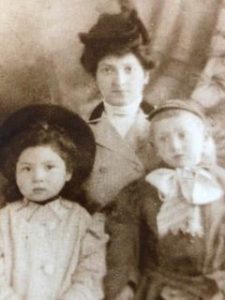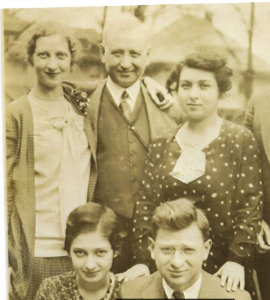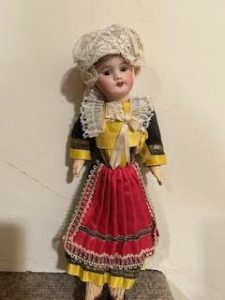
3 generations, summer, 1953
Belle Potocsky and Zalman Beckenstein were married in the “old country”; Bialystock, Poland (part of Imperial Russia) in 1902. I have a dress that Grandma wore to a ball when they were courting. These were not “shtetl” Jews like in “Fiddler on the Roof”. They were educated and erudite. My grandmother’s dress is a beauty, with a train and a loop to pick up for dancing, a velvet opera jacket, whale bone stays and fancy lace up the high collar of the separate top. Here is a photo taken in 1972 of me modeling it. I have since had the ensemble restored and packed away in acid-free tissue. Someday, I plan to give it to a museum of Jewish heritage.
A doctor I admire tells me that Bialystock was the intellectual capital of the diaspora. I had never known that. My grandfather was prosperous. He worked for a watchmaker, buying and selling jewelry, went on buying trips to Warsaw. My grandmother had a maid. Two children came along quickly, Anna and Joseph, one dark-haired like Grandma, the other with copper hair, very fair. Grandpa was blonde and blue-eyed.
They were friendly with everyone in their community, which saved them when the pogroms swept through in early June, 1906, killing all the Jews they could find. As the pogrom began, my grandfather ran home through back alleys to escape the gunfire and the family was hidden by their Christian landlords. Belle and Zalman quickly booked passage to America’s golden shores and arrived in New York in August, 1906. My mother always told me proudly that they came second class, not steerage. A friend of my brother’s found the manifest for the ship.
Some years ago, a cousin visited Bialystock and told me there are no Jews remaining, only two plaques, one in a park where Jews were gunned down, one where the burned synagogue stood. The synagogue was burned decades later, when all remaining Jews had been herded into a ghetto by the Nazis in 1941. During Saturday morning services, the doors were barred shut and the occupants were burned alive. All other traces of a once-thriving community have been wiped out.
Since Grandma’s parents were already there, they made their way to Toledo, Ohio, and shared a two-flat with them. The homes were connected through the basement. Zalman, now known as Samuel Stein (he dropped the “Becken”; Grandma’s family became “Perlis”, after a sister married a man with that name) opened a jewelry store on Adams St. in downtown Toledo, a store that prospered and provided a living for himself and his son, Joe, who joined the business as an adult.
Two more daughters were born once the family was settled in Toledo; blonde Stella and my mother, Connie, who was fair, but with dark hair. I often felt that the four children were a perfect display of Gregor Mendel’s genetics code.
The featured photo shows 6 month old me, sitting on my mother’s lap, flanked by her parents in our Detroit backyard, summer of 1953.
Grandma was the oldest of 9 children, all of whom came to live in the US, most in Detroit. Two of her siblings married cousins of Grandpa’s, so there were several double cousins in the family. They included professional people, a doctor, a lawyer, one played clarinet and taught my mother about the instruments in the orchestra. He played in the Marine band that was on the ship that brought Woodrow Wilson to Paris to sign the peace treaty that ended World War I. He brought my mother back a doll from France that I now own.
Grandpa had two brothers who came to the US (one also shortened his name to Stein, the other to Beck), one who moved to South America and lost touch with the family. He had two sisters who stayed behind in the old country. After the first World War, that part of Russia became Poland. That whole branch of the family perished in the Holocaust except for one daughter, Paula. She married a Zionist and they fled overland, arriving in Palestine in 1939. My grandfather was in touch with them for a while, but eventually lost touch. We didn’t even know her maiden name, much less her married name.
My brother spent two years in Israel as he studied to become a rabbi. There are amazing networks to find people displaced by the Holocaust and my brother set about to find our cousin, with very little information. But the first person he asked happened to know someone from his army days who had come from Bialystock. His name was Yaacov Nishri. It was Paula’s husband. My brother found her! She was over-joyed to find the son of a first cousin.
My brother took me there when I visited in 1972. It was unbearably hot and I had my long hair braided and twisted across my head. When Paula opened her apartment door, she startled. She said I looked like her sister Eshkie, murdered by the Nazis. Family ties run deep. I stayed with her and her family for a week. She and Yaacov spoke no English. They just fed me and fussed over me. Her daughter Hannah, just out of the army, spoke excellent English and we became friends, though we also lost touch as the years wore on.
My grandfather loved this country and all it had to offer, but he understood its limitations. He knew that Jews were still disliked and couldn’t hold certain jobs. My mother wanted to be a librarian (in the mid 1930s) but was told this was not a profession open to Jewish women. She became the book keeper in her father’s store. My grandmother was terrified of dogs her whole life, as the Tzar’s army had turned them loose on the Jews during the pogroms. Some things one just couldn’t get over.
My grandfather died in 1964, but I’ve thought of him at several moments throughout my life. As I stood at the Wailing Wall (what remains of the Second Temple) in Jerusalem in 1972, I thought how he would have loved to pray there, and to know that his youngest grandson would soon be a rabbi (and become a well-respected Talmudic scholar). I think of my grandfather every time I vote, grateful for our freedom to exercise our civic voice.
I am terribly worried now, thinking that my family survived pogroms and the Holocaust, the most horrific biased expressions of hatred against Jewish people the world has seen. Antisemitism is on the rise. The current administration finds it convenient to fan its flames and feign ignorance. It is intolerable, yet it is tolerated.
I recently returned from the beaches of Normandy where the US is still viewed as a liberating force for good. But at the Caën Memorial Museum, an excellent exhibit covered the end of World War I, the Weimar era, the rise of fascism and the Nazi era. It brought echoes that sound all too familiar today. Santayana warned those who do not study history are doomed to repeat it. Let us learn rather than repeat. We don’t need strong men, falsely promising that they, alone, can solve the ills of society with bluster and false promises while fanning the flames of fear of “the other”, slowly stripping away our civil liberties in the name of “safety” and muzzling the free press. That is how Mussolini and Hitler came to power. My grandparents flourished in this country, as did many of our forebears. This can be a great country, if we remember who we are and where we all came from. As we celebrate another 4th of July, let us truly strive to be the land of the free that the authors of the Declaration of Independence envisioned.
Retired from software sales long ago, two grown children. Theater major in college. Singer still, arts lover, involved in art museums locally (Greater Boston area). Originally from Detroit area.







Fascinating history of your grandparents, Betsy. We have met them before in other Retrospect stories, and it’s nice to get additional information about them. And as always, your pictures are wonderful. I love seeing you in your grandmother’s ball gown. Amazing that it has lasted all these years.
Your last paragraph, reminding us about the dangers we are facing now, is right on. Happy 4th of July as we fight to regain control of our country before it is too late!
Yes, Suzy, I have written about my grandparents before, weaving their stories into many narratives, but this is the fullest account of their tale. Thank you for your admiration of the photos. I took the dress to the Lowell Textile Museum (unfortunately, now defunct) many years ago and paid a great sum of money to have it fully restored, as the material was, indeed, rotting. It is now well-preserved. Lowell was once the hub of the textile industry in the US – no longer!
I was truly struck by the similarities between the rise of fascism, based on what I gleaned from my recent visit to Normandy, and what I perceive is happening in our divided country today. We must beware and fight to keep our liberties and remember that Hitler was freely elected by the German people. That is a scary thought.
Betsy, I can completely relate to your story and loved learning your history. My great grandfather who ended up in Odessa (see my story just posted) originally came there from Vilna to find work. He and my grandmother were very fair and could “pass,” and I ended up with their genes! So much of my mother’s family history was lost because of the Holocaust. I just retired and plan to do an oral history with my mother (who is nearing 90) to see what I can recover and research. These stories help us and others be more compassionate to today’s immigrants and refugees.
Do that oral history while you can, Marian. It is so important to preserve those memories and history. This outlet is one way, and an important outlet. I agree; we all need to remember to be compassionate and empathetic to make this world a better place. I look forward to reading your story.
I was struck by the harrowing details of the pogroms in Bialystock. Sometimes we forget that Hitler didn’t invent antisemitism. It was fortunate that your grandparents survived, and I salute you for tracing their story through migrations and name changes.
Some of today’s immigrants are escaping the same kinds of persecution. If we let them in, I trust they too will share in—and contribute to—the American dream.
I hope this country grows a conscious, John. Many people have one, but so far, the “powers that be” are sowing fear rather than understanding and are not letting in those who have been the victims of persecution. What makes this country great is its melting pot sensibility. There is room for everyone and we can learn from all.
Great piece Betsy! These legacy stories are so important..
Thanks, Barbara. I totally agree! Don’t remember if you saw the whole Facebook thread around the story, but after I posted it, had a great cousins conversation. Being the youngest, there was so much I didn’t know that I was able to add to the story, both for documentation and making the story better. I want to capture as much as I can before it is all gone, just as you are doing.
A rich and powerfully family story, powerfully told! I loved that you have taken on the task of story-teller here, drawing on a fast-disappearing responsibility that predates even the written word. But perhaps the most moving passage for me concluded this well-documented ancestral tapestry. Your reflection on the past and its messages for today ring clear, heartfelt, and absolutely necessary. We MUST continue to study our past.
BTW: Have long been fascinated by the arc of history drawn from Weimar’s purposeful mission to celebrate art in the midst of chaos, a tale of the death of an artists’ class, another story we should all take to heart today and in retrospect. Thanks!
Thanks, Chas. Everyone on Retrospect is a storyteller as we document our own lives. In this case I’ve gone back three generations to narrate the harrowing escape (and in some cases, non-escape) of my Jewish family’s encounter with state-sponsored death. My older son traveled to Berlin some years ago and found a thriving artist community on the margins. He maintains that art will always find a way to express itself, particularly in the face of repression. Let’s hope he is correct.
Hi, Betsy.
Loved reading this. Touching, moving, resonant…. Also, Brisket! I could see the genes at work there. Not joyously. As I write this, in my minds eye is the image of the front of your house. Was it on Hendrie? I’m in NYC, now and regret not having made an effort to get in touch when I visited Jane, recently. I hope you are well. Happy New Year!
Bob Levin
Thanks, Bob. My house was on Concord Rd, a few doors off Hendrie. I’m sorry I’ve missed you, but hope you have a good time in NYC and Happy New Year to you as well.